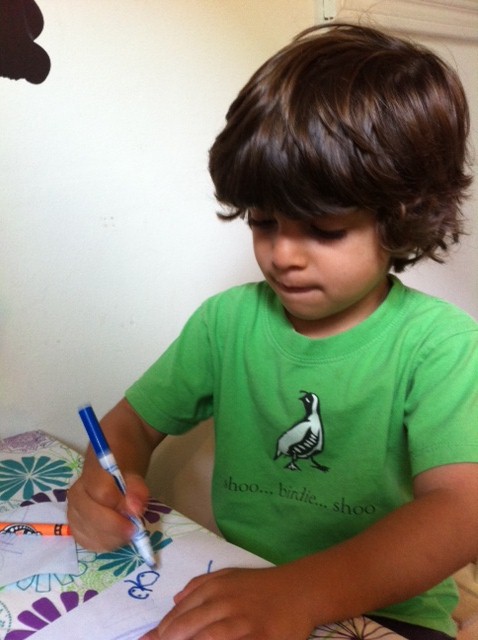Speech and Language Developmental Milestones at 4-5 years:

- Children use sentences of at least 5 words.
- Children use adult like grammar.
- Children tell complex stories, with a beginning, middle and end that are generally easy for you to follow.
- Children give their first and last names and tell you if they are a boy or girl.
- Children produce most consonant and vowel sounds correctly, but may still have difficulty with some sounds, including “th”, “s”, and “r”.
- Children speak clearly enough for people outside of their immediate family to understand most of the time.
- Children enjoy pretending with their toys.
- Children pay more attention to print, both on the pages in books you read together and in signs and lists: They begin to learn the sounds that some letters make.
- Children follow three-part directions like “Get your boots, put them on, and wait at the door.” without gestures.
- Children increasingly show interest in letters and learn their names.
How to make daily routines into language learning opportunities
- Language learning happens all day long. At this stage, children are learning language very quickly and during everything they do throughout the day.
- Children enjoy telling stories about what has recently happened or what will happen in the near future. When planning special events, involve children in planning and use these opportunities to develop stories with them.
- Children, at this stage, enjoy being a helper, so give them chores to do. This helps them to feel good about themselves and also gives them opportunities to learn a whole new vocabulary. Helping to sort laundry into categories (i.e. socks, pants etc.) help them to classify objects. You can also use this time to have them think about other categories of objects and to think about which ones go together (e.g. You can ask questions like: “If I have a sock, pants, and cup, which one doesn’t belong?”). If children don’t know the answer, you will be able to talk about which items belong together and why.
- Mealtime is a wonderful family time for children to share what they have done during the day. Whether they are in preschool or kindergarten, they can share their day. You will get better responses if you give them choices of things to talk about (e.g. Rather than “What did you do at school today?”, ask “Did you paint or did you play at another centre?”).
- You can plan what you have for dinner and encourage children to join in the conversation. They can talk about the food they like and you can help them to talk about categories of food (e.g. “Apples are fruit and corn is a vegetable.”).
- Give children choices throughout the day. This helps them become more independent and gives them opportunities to use their words and sentences (e.g. “What would you like to wear today? It’s raining, so what do you think you need?”).
- Talk about the order of your daily events: Children feel comfortable knowing what will come next (e.g. “First we wash our hands, then we can set the table for dinner. After dinner, we can play a game.”).
- Children at this age look like they are reading the words in their favourite books. If you have read a book many times, children have learned the words and take great joy in “reading the book” to you. Encourage children to learn about print by pointing out the letters on the page and the sounds they make. Help children learn more about letters and their corresponding sounds, by drawing their attention to several sounds while you are reading. The libraries in the Thames Valley region offer story times for children. This is a wonderful opportunity for you to learn about a variety of children’s books and to meet other parents in a fun, interactive environment. A visit to your public library for story time is a good way to get ideas for reading with children and to meet other parents. Library story times and other activities are listed on library websites such as the London Public Library, Middlesex County Libraries, Elgin County Libraries and Oxford County Libraries.
What are the best ways to encourage speech and language at this stage?
- All children need to have a variety of experiences. They are now in school and should have a lot to talk about and share.
- Children are now starting to speak like an adult, but sometimes they need extra time to think about the words they say. Give them time to express themselves.
- Expect that children use longer sentences with correct grammar. They need to hear good sentences with a variety of grammar from you to help their language grow.
- Children like to hear stories about their daily activities. Talk about what you have done together during the day, giving them longer words and more words that help them talk about their experiences.
- Encourage number and letter recognition.
- Count the number of forks you put on the table and relate that to the number of family members.
- Print the child’s first name and put it on their bedroom door. Spell the letters for them so they hear them and see them.
- Encourage children to “write”. Have paper and pencils available for them and ask them to talk about what they have written. Even though it may look like scribble to you, this is the beginning stage of writing.
- Play rhyming games with children (eg. “Ball rhymes with fall.”). This is another pre-reading activity that helps in their reading development.
- Participate with your children in literacy and numeracy programs for preschoolers by visiting your community Ontario Early Years Centre, where there are programs for babies, toddlers and preschoolers and workshops for parents, at no charge. For more information visit the website for the Ontario Early Years.





